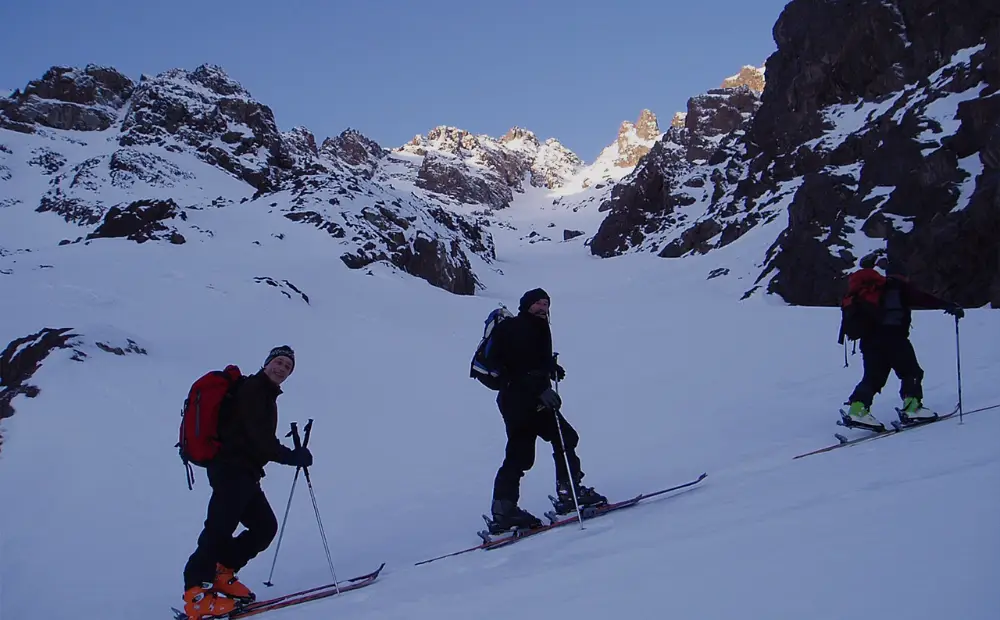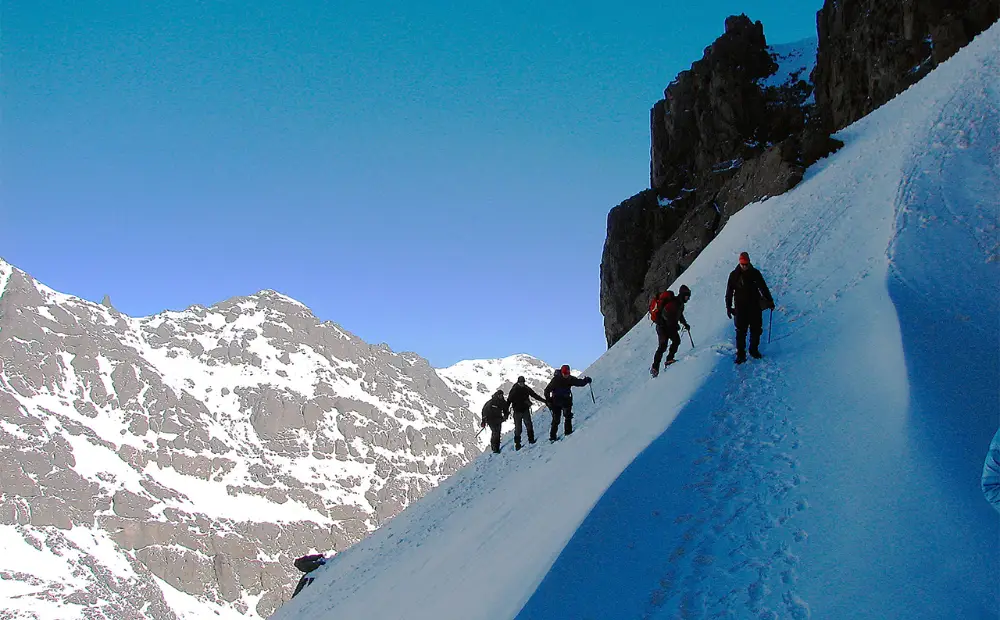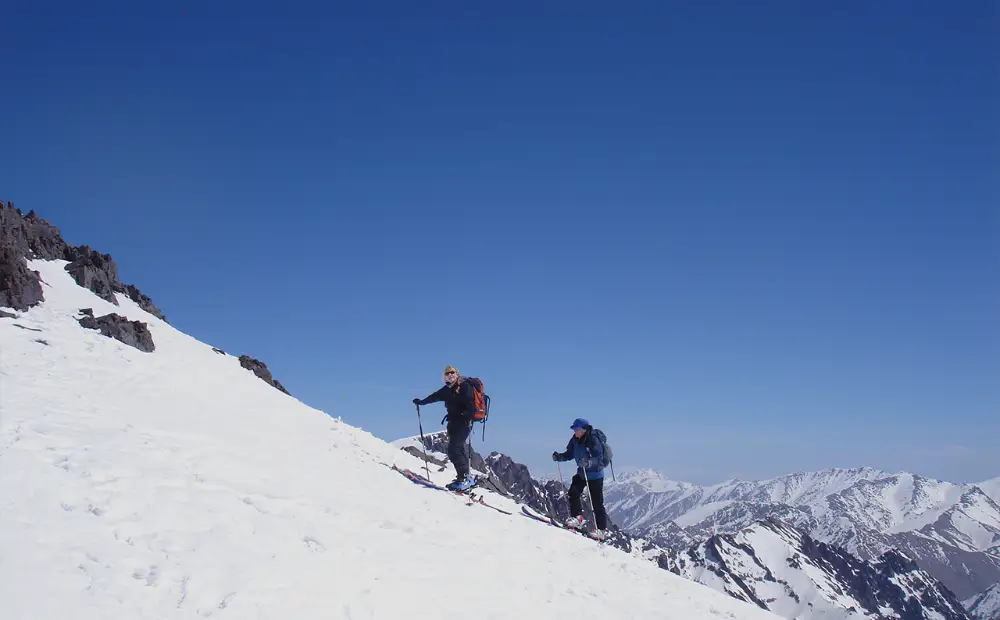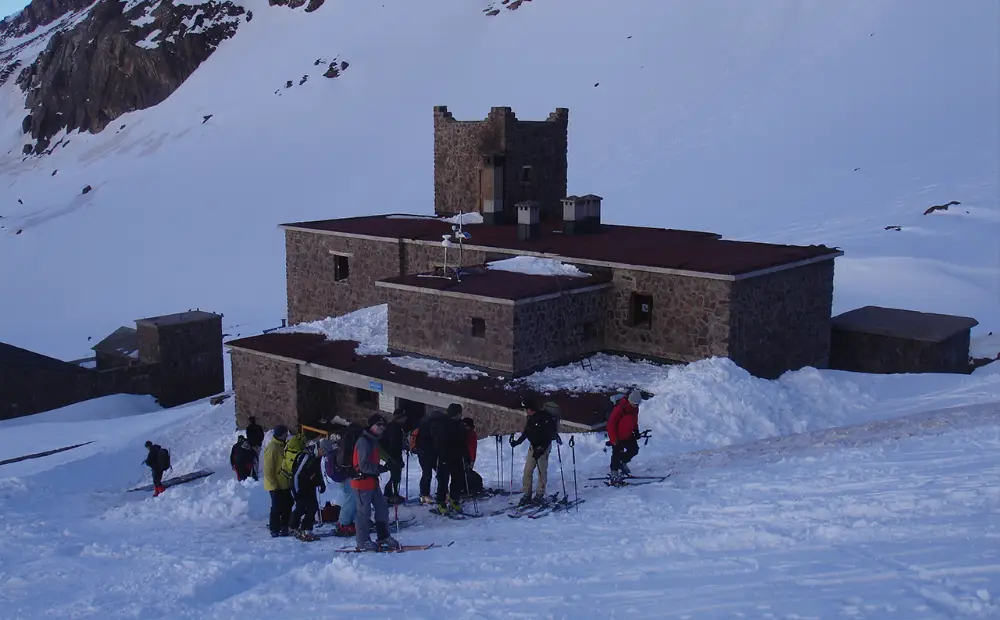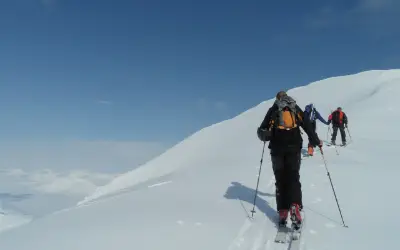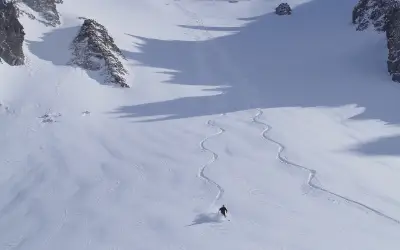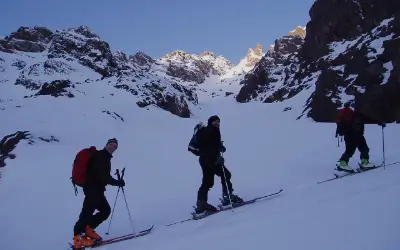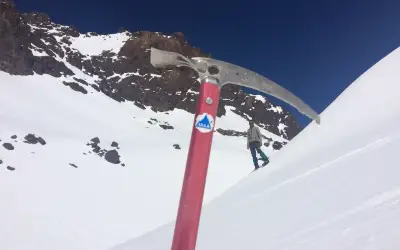
Atlas Mountains skiing – 6 Days Adventure
Tour snapshot
6 Days
Atlas Mountains - Morocco
450 € / per person
Learn more
Overview
6 Days Ski Touring in the Atlas Mountains Morocco
One of the other ways to see Morocco and High Atlas is to travel by ski, a perfect combo of ski tour within 5-day in Toubkal and its peaks, with an endless scenery of Toubkal regions.
What's Included
Group Pricing
| Participants Number | Price |
|---|---|
| 2 peopel | 480 € / per person |
| 3 to 6 peopel | 475 € / per person |
| 7 to 13 peopel | 450 € / per person |
Booking Form
From EU 450€ / Per personItinerary
After your arrival at the airport, you will be picked by our team to your Riad where you will spend the night. During the afternoon, you will have time to discover the city. In the evening, the dinner will be served to you at the Riad.
At around 8:00, you will be transported from your Riad in the direction to Imlil, passing by Moulay Brahim Gorges and via Asni. In Imlil at (1750m), you will meet your Berber team who consists of your guide and muleteers. After a cup of tea, you will start your journey heading up along the valley to the shrine of Chamharouch (2300m), a holy place for pilgrims and tourist, through a juniper forest. Here, you will have a break in order to enjoy your lunch. We then continue our journey eastward zigzagging till we arrive finally to Toubkal Refuge where we will spend the night. 6 or 7 hours walking.
Today starts with an early wake up for breakfast around 6:30 am. We climb Jebel Toubkal, North Africa’s highest peak 4167m. The ascent will begin at 6:00 am; we’ll leave the Mountain hut and join a steep trail. The route initially zigzags eastwards directly above the Refuge and crosses snow-covered scree slopes, before passing between tow rocky guardian peaks. We will stop a few times for a short break to have some water, orange, and Moroccan nuts. Within 3-4 hours, you will be able to enjoy the magic views of Toubkal Summit and peaks over 4000m before skiing down back to the refuge, a descent of 1000m. 4-5hours.
We will ascend the way that goes up to Ras n’Ouanoukrim at 4080 m, passing by the pass Tizi n’Ouagane, a small and narrow gorge, continue up till we arrive at a place called Ouanoukrim from where you will see Timesguide and it’s a perfect place to ski from to Timesguida 3720m. Then, descend along a narrow spot of Ouankrim down to the refuge of Toubkal. Approx: 4hours.
Today’s journey starts from the refuge along the valley up, to the right (a walking of 30-40minutes). We Continue up, crossing some slopes and see some obvious passes like Tizi n’Amrharas to the right and the mount Afella where Akioud is located westward. After seeing the beauty of Akioud and the surrounding peaks, you will have a superb ski down to the base camp. After lunch, you head down, passing through Sidi Chamharouch and Armed to get to Imlil from where you will be transported back to Marrakech. Approx 10hours.
After breakfast in the hotel, the transport will transfer you to the airport, carrying with you a fantastic memory you will tell your families and friends. We say goodbye and wishing you a good flight back home and a good life as well.
Additional Informations
About The Trek
Mount Toubkal – Essential Info
At Mount Toubkal the World we believe in providing our clients with the best service and key to the enjoyment of any adventure holiday in our opinion is the balanced and up-to-date information offered by the tour operator. We are confident that the items detailed below when taken in conjunction with a reputable and reliable guidebook will enhance your Trekking experience as well as ensuring you receive the very best service from Mount Toubkal the World in the Atlas Mountains of Morocco.
M-T : STAFF
It is important that our staff in our Mount Toubkal office have experienced the wonder of High Atlas Mountains Trekking and are able to answer many of your important questions.
Mohamed, for example, has trekked in the Toubkal and Berber regions and visited many of the places included on our hiking itineraries; he has also made it to the top of Jebel Toubkal – many of the photos on our website were taken by him and his traveling companions on his various trips to the region.
M-T : GUIDES
All Mount Toubkal guides are fully licensed and are experienced from an early age in the Atlas Mountains areas, and guiding continues to be the heart and soul of who we are. We require that all of our guides undergo extensive safety training before officially joining us a mountain guide /or winter guide, local knowledge and guiding abilities. We believe that a local, licensed guide will offer more insight into the High Atlas region and Berber people as well as enhancing the local economy.
As well as a tip (see below) if you have had a great experience with your guide you may wish to offer him something of yours that will assist his duties.
Please be guided by your guide’s expert advice on difficult or exposed paths and please respect the prayers of your guide and muleteers – they will usually do this outside of walking times so as not to interrupt your hiking.
M-T : PORTERS
Most of our porters are from the Atlas Mountain region who are able to perform carrying tasks in the high atlas and around all types of trails in Toubkal. They will carry your luggage, food and other necessary items in a safe and secure way. They are very conscious of maintaining your belongings in good condition. We would like to request all our clients to go with an open up and be ready to experience all the fun and excitement of your trek, and also rest assured that our Porters and Guides are comfortable and happy people to be accompanied by. You can ask any quarries you may have about the culture, people and country. You feel very safe, comfort and pleasure after hiring a Guide and Porter.
Credentials of our Porters
– They are of mid-age and able to carry 25-30 kg stuff without any hesitation.
– They are mostly from the Atlas mountain regions and have been working in the Trekking field as a Porter for many years.
– They are strong, powerful, capable and caring.
– They have more knowledge about the trails so they may alert you about the ways and other potential hazards.
– They are very honest and humble of their personal integrity.
M-T : MULETEERS & MULES & LUGGAGE
Your team of muleteers, along with mules, will vary in number depending upon the size of your group and whether you are camping or staying in gites/refuge but they will all perform the same function which is to provide a full back up service for your hike, cook and prepare meals and set up the evening camp.
The mule team will load up your luggage, food and, if relevant, the camping equipment at the start of each day but will not always walk either at the same time, pace or route as your hiking party so it is important that you consider which items you may require to carry yourself in the morning and then again in the afternoon as on some days you may only meet up at lunch-time.
The mules are completely used to carrying the loads and it is not unusual for them to carry in excess of 80 kgs each which is equally balanced in two baskets. The muleteers take great care in both hygiene and presentation of your food and perform wonders with such limited conditions.
We recommend you take your trekking luggage in a large holdall or rucksack which can perhaps be folded up inside your main luggage if you are also traveling around the Atlas Mountains and wish to have the security of your usual suitcase(s). You should also take a suitable daypack which will carry drinking water, camera, hat, raincoat, etc. as you may not be in direct contact with your support team at all times during the day.
WEATHER
In winter much of the region above 2500m can be snow-covered and hiking in these areas could require the use of crampons and ice axes. High winds and precipitation in whatever form may preclude some routes and this will be discussed before you set out or can be modified at any time with the advice of your guide.
RAMADAN
We will maintain our programme of trekking during the holy month of Ramadan but we would ask you to respect your team by allowing them the courtesy of eating an early breakfast (before sunrise) and to avoid, where possible, drinking, smoking and snacking immediately in front of them during the day – they will, of course, prepare the usual lunch though as part of their duties.
WATER
It is important to drink lots of water during your hike; water can be purchased in Marrakech before you set off or in Imlil. It is also possible to obtain water from small kiosks in many villages and from the trailhead of Imlil and at the Toubkal refuge. You will need to carry some of this yourself but your mules will carry some more; please discuss with your guide the water requirements on a regular basis.
MEALS
Breakfast – tea, coffee, juice, fruit, milk, bread, butter, jam, cheese, porridge
Picnic lunch – fresh Moroccan salad, cheese, sliced sausage, tinned tuna fish and sardines, bread, fruit, mint tea (pasta, beans, potatoes, and rice can also be included).
Dinner – Soup, Tajine (chicken or mutton with vegetables), spaghetti, couscous (main courses rotate depending on the duration of the trek, although you are more likely to get couscous on a Friday), bread, coffee, tea, cake, fruit.
* Vegetarians, vegans and those with special dietary requirements of any kind need to advise at time of reservation.
TIPS
Naturally, tipping is an entirely personal matter and a little goes a long way in Morocco; however, we are always asked for a little guidance so here is what we would consider as fair, amounts refer to your guide, a smaller amount can be given to your muleteer team:
1-3 days hiking –220 DHS per person total
4-7 days hiking – 300 DHS per person total
8 days + hiking – 350 DHS per person total
Of course, you can offer more if you wish; tips are usually held and then passed over during a handshake to avoid any embarrassment or undue attention to the matter.
GRADING OF HIKES
Whilst we try to ensure that our descriptions are accurate for most people wishing to undertake hiking in the Atlas Mountains, clearly, there are many different factors that contribute to the difficulty of a particular hike.
These include the length of day, terrain, altitude and weather conditions. Since these factors are necessarily variable, any system of grades can only provide a general indication.
We have tried to make our system as clear as possible but it cannot account for personal abilities or experience.
CLIMBING MOUNT TOUBKAL
The hike to the top of this peak which is almost 960m up from the refuge will usually take at least 3 hrs and start at 5 am followed by a fairly hard 2-3 hrs walk down amongst the loose rocks by another route where possible. It is essential that you are fully prepared for what is for many people a demanding walk. Try to get a good sleep the night before and a good breakfast (plus a Mars bar!) before setting off.
You are likely to need warm clothes all year round and strong boots are essential, even in summer a warm hat would be useful as well as some protection from the wind. If you climb down the northern route then look out for the wreckage of a plane which hit Toubkal in bad weather in the early 1960s, purported to be carrying guns from Portugal.
ENVIRONMENT
It is vitally important that you respect the mountain environment; litter, in particular, is damaging the landscape and can injure animals. Please, please take all your litter home or drop it off at suitable points.
Mount Toubkal guiding teams are proud guardians of their natural heritage and will ensure that rubbish is collected and either taken out or burned where possible. In fact, our guiding teams have been known to take a few extra minutes to collect and burn the rubbish of groups that were not so environmentally sensitive. Some organic matter can be left as much of it will be eaten by the local goats.
REFUGE
The refuge is simple but offers warm showers, a few western toilets and a warm lounge with electric lighting in which to read or chat with your fellow hikers. There is a full kitchen for your team to cook in and a couple of dining areas. Please note that boots must not be worn in the refuge so sandals, shoes or flip-flops should be taken to keep your feet (and socks) warm, dry and clean.
Clothing and Equipment
You should dress according to the altitude and the environment you will be located in. Most treks are in high altitude climates in remote areas. Therefore, there are often large temperature swings. Temperatures are often colder at high altitudes.
Clothing for Trekking
Trekking boots or lightweight walking shoes. Having comfortable footwear is essential for a good trek. Make sure all footwear is broken in well prior to your trek. Do not break in boots on your trek,
A tracksuit and a pair of track shoes to wear in the mountain refuge,
Two pairs of woolen socks for trekking shoes and track shoes,
Warm down jacket and rainproof jacket with hood for protection from rain,
A Woolen hat for the cold and sun hat or cap for sunny days
A pair of woolen gloves and pair sandals to wear in the mountain refuge,
Two cotton T-shirts and two pairs of long shorts/skirts
Woolen shirts and thick sweaters as well as wind and waterproof trousers,
Pair of light or heavyweight trouser and one lightweight long sleeve shirt,
Two pairs of thermal undergarments,
Equipment for Trekking
Trekking or duffle bag to carry trekking gear. Mount Toubkal can provide a duffle bag for you to borrow during your trek. This will be returned after your trek,
Ice Axe and crampons,
Trekking daypack for personal items such as water, snacks, extra layers and camera,
Water bottles,
Sleeping bag,
Travel Pillow,
sunglasses,
Ski poles,
Ski
Ski Boots
Helmets
Small torchlight or headlamp with spare batteries,
Sunblock,
Lip balm with sunblock in it,
handkerchief or wiping papers,
Money belt,
First-aid kit,
Trekking equipment is available at Imlil Center. Mount-Toubkal can recommend shops for you to purchase equipment. If you do not wish to buy equipment, you can easily hire or rent them for the duration of your trek at reasonable prices.
Similar Experiences



